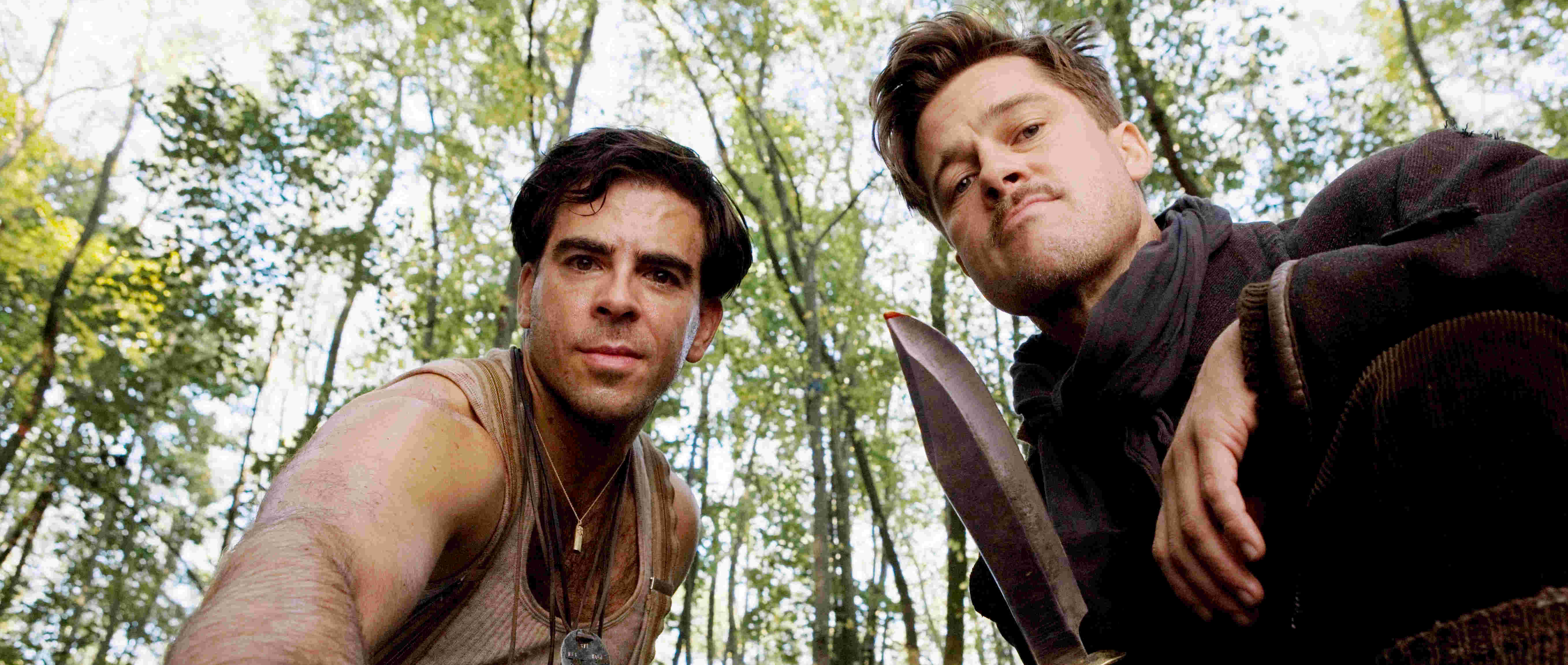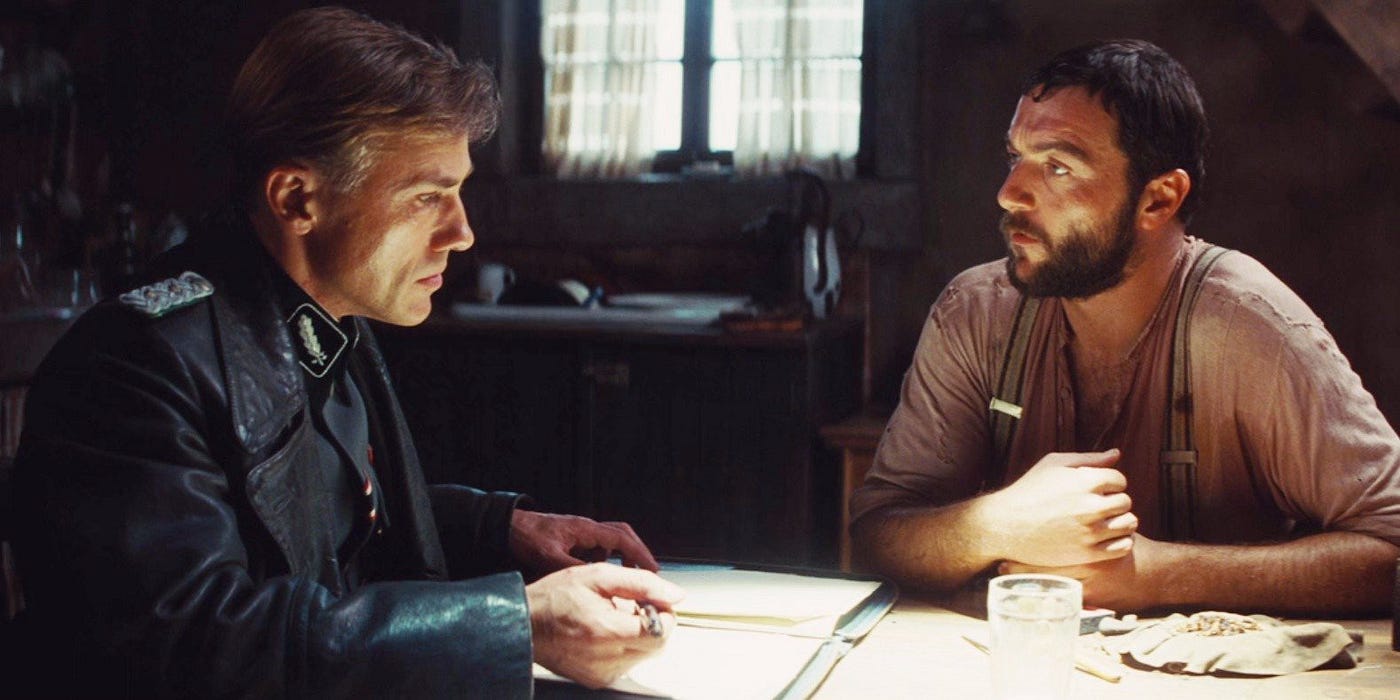Inglourious Basterds | Directed by Quentin Tarantino // Starring Brad Pitt, Christoph Waltz, Mélanie Laurent, Diane Kruger, Michael Fassbender, and Eli Roth
Set the mood with some music!
Summary (Spoiler-free): Inglourious Basterds is a revisionist, pulpy, genre-bending spectacle that gleefully rewrites history. Set in Nazi-occupied France during WWII, the film follows multiple intersecting storylines, including a ragtag group of Jewish-American soldiers out for revenge, a German actress turned Allied spy, and a young French woman with a vendetta of her own.

When I first saw Inglourious Basterds, I remember thinking, “Wait… he can do that?” And that feeling — of surprise, disbelief, and total admiration — never really left me. Tarantino doesn’t just break the rules in this movie; he burns them to the ground and dances on the ashes. And it’s glorious. He takes a setting as serious and sacred as World War II and turns it into a canvas for catharsis, spectacle, and revenge fantasy — and somehow never disrespects the gravity of the subject.
From the first frame, you know you’re in Tarantino’s world. The long, slow-burn opening scene is a masterclass in tension-building. Christoph Waltz’s Hans Landa is so polite, so charming — and so utterly terrifying. It’s a performance that earned him the Oscar and rightfully so. Every line delivery is like a noose slowly tightening. The film is filled with scenes like that — talky, drawn-out, simmering with dread — until everything explodes. Violence in Tarantino’s hands is operatic, stylized, and often horrifyingly satisfying.
Tarantino’s choice to rewrite history is probably the most polarizing aspect of the film — and also its greatest triumph. It’s a move that’s not just bold; it’s almost defiant. And I love it. In real life, the evil at the heart of the Nazi regime ended in trials and suicides and decades of reckoning. In this movie? Tarantino lets the audience feel something they never got to feel: a cathartic, violent, cinematic justice.

Of course, some critics questioned the ethics of that — of turning genocide and fascism into a grindhouse revenge flick. But I’d argue that what Tarantino does is take history’s darkest chapter and give the powerless the upper hand. He doesn’t trivialize it — he reclaims it. It’s not meant to teach history. It’s meant to be emotionally honest, not factually so. And in that sense, it’s kind of brilliant.
The cast is stacked. Brad Pitt’s Lt. Aldo Raine is the closest thing the movie has to a traditional war hero, and he plays it like a spaghetti western character filtered through a Southern drawl and a bucket of moonshine. He’s hilarious, intimidating, and weirdly lovable. Mélanie Laurent, as Shosanna, delivers a quieter, more emotionally grounded performance — and she might actually be the heart of the film. Her scenes are full of pain and power, and the final sequence (no spoilers) wouldn’t land half as hard without her.
But again — this is Christoph Waltz’s movie. He walks away with every single scene. Hans Landa is one of the best villains ever put to screen. He’s not a mustache-twirling cartoon — he’s a predator who smiles while sharpening the knife.
From a technical standpoint, this is top-tier Tarantino. The cinematography by Robert Richardson is lush and detailed, with frames that somehow feel like both an homage to classic cinema and entirely modern. The editing by Sally Menke (Tarantino’s longtime editor and secret weapon) keeps every scene humming with tension and unpredictability.
And then there’s the music. As always, Tarantino pulls from an eclectic mix of tracks — Ennio Morricone, David Bowie, traditional Italian western scores — and makes it all feel cohesive. There’s a scene set to Bowie’s “Cat People” that might be one of the coolest uses of music in any Tarantino movie ever. The needle drops don’t just accompany scenes — they elevate them.
Watching Hitler and his top Nazis get absolutely lit up in Inglourious Basterds is one of the most satisfying moments in modern cinema. It’s not subtle. It’s not historically accurate. And that’s exactly the point. For two hours, the film builds up this world of tension, fear, and brutality, and then it delivers a moment of pure, unapologetic catharsis. You’re not watching real events — you’re watching what so many people wish had happened. There’s something genuinely thrilling, even healing, about seeing these monsters not just defeated, but obliterated in a blaze of vengeance and justice. It’s the ultimate “what if” fantasy, executed with such boldness that you can’t help but cheer. Which I did the first time I saw it. Literally fist pumped.
Inglourious Basterds is the kind of movie only Quentin Tarantino could make — and thank God he did. It’s provocative, brutal, hilarious, and exhilarating. It’s a war movie that dares to be something else entirely: a genre cocktail with something real to say about justice, revenge, and power.
Yes, it rewrites history. But in doing so, it gives the viewer a kind of emotional closure that the real world never offered. And that’s the magic of movies. Not to document what happened — but to imagine what could’ve. It’s not just entertainment. It’s a reclamation.
This isn’t just one of Tarantino’s best films. It’s one of the most audacious, unforgettable pieces of cinema in modern film history.